- Home
- Greg Keyes
The Charnel Prince Page 10
The Charnel Prince Read online
Page 10
“Hello, windsmith,” Artwair said. “What sort of trouble have you gotten us into?”
“My lord?” Leoff repeated.
“You didn’t know?” Gilmer said. “Sir Artwair is our duke, cousin to His Highness, Emperor Charles.”
“No,” Leoff said. “I did not know that. My lord—”
“Hush,” Artwair said. “This is of no importance now. They’re coming, close on your heels, and they will find you. The basil-nix has a keen nose.”
“Basil-nix?”
“Auy. Our darkest legends come to life, these days.”
“That’s what was in the box?”
“Auy.” He grinned tightly. “When I arrived, they were walking the streets with it, shining it about like a lantern. I saw the last of the townspeople die. I have my old nurse to thank for my life, for only from her tales did I understand what was happening. I averted my eyes before its gaze turned my way. Of course, when you burst its cage, I nearly died again, because I was watching. Still, that was clever. I think you killed more than half of them before they got the thing covered again.”
“You saw?”
Artwair nodded. “I was watching from the south tower.”
“How did they manage to capture and cover the thing?”
“They have two blind men with them,” he said. “They serve as its handlers. The rest walk behind. The cage is like an aenan lamp, closed on all sides but one. It makes a light, this thing, and once you have seen it, you can resist only through the greatest contest of will.”
“But the cage is shattered now.”
“Auy. And so they must take greater care, and so must we.”
“We must flee, before they find us.”
“No,” Artwair said softly. “I think we must fight. Two men remain at the dike. It will take them longer, but they will still open it if we give them time. We can’t allow that.”
“No,” Gilmer agreed. “Not after Broogh gave its life.”
“But how can we fight something we cannot look at?” Leoff wondered.
Artwair lifted something near the door. Two flasks of blue glass, filled with liquid. Rags had been stuffed in the top.
“Here is my plan,” Artwair said.
Moments later, Leoff stood facing down the stairs. Artwair stood below him on the first landing, a shadow with a bow held before him, and an arrow nocked. Gilmer crouched behind Leoff at the window, with his eyes squeezed tightly shut.
“They’re here,” Artwair’s voice came up. “Be ready.”
Leoff nodded nervously. He gripped a candle in one hand and one of the flasks of oil in the other. Gilmer was similarly armed.
Leoff heard the door open, and the bow sang a low pitch.
“They have a bow!” someone yelped.
“Move up!” another voice commanded. “They can’t hit what they can’t see. If they open their eyes, they’ll die.”
Footsteps started up the stairs. The bow whined again, and again, and someone shouted in pain.
“A lucky shot,” shouted the person who seemed to be their leader. “Up, and quickly.”
“Now!” Artwair hollered, and ran back up the stairs.
Leoff lit the oil-soaked rag.
And he saw a light suffusing the landing. It was beautiful, golden, the most perfect light he had ever seen. A promise of absolute peace filled him, and he knew that he could not live without seeing the source of that light.
“Now, I say!” Artwair shouted.
Distantly, Leoff heard glass breaking and a renewal of shouts from below. Gilmer must have thrown his flask, aiming for the entrance to the house. But Gilmer didn’t see the light, didn’t understand . . .
Leoff suddenly remembered the corpses in the inn. He remembered their eyes.
He threw the flask at the landing Artwair had just vacated. The light was brighter now, more beautiful than ever. Even as flame blossomed like a many-petaled rose, Leoff leaned out to catch a glimpse, just a small glimpse—
And then Artwair knocked him roughly to the floor.
“By all the saints, what do you think you’re doing? You cannot look!” he snarled.
More screams. It was a night for screams. The oil burned quickly, and so did the mostly timber house.
“Gilmer!” Artwair shouted. “Did you hit the doorstep?”
“Auy, that I did,” Gilmer replied. “I reckoned it was worth risking a peek, since they had the thing on the stairs. My aim was true.” He scratched his head. “Course, now we’re trapped in a burning house.”
“So are they,” Artwair said. He went to the window, pushed open the curtain, and set an arrow on the bow. “Now is the reckoning,” he said. “Watch the stairs. If any get through, call out.”
The stairwell was already an inferno, and choking smoke boiled up. This was also a night for fire, Leoff mused. He was destined to burn, it seemed.
He heard the bow twang over the roar and over the screaming. And again, as Artwair fired at something in the street.
A shadow came up through the flame then, something the size of a small dog, but serpentine. The flames turned golden.
Leoff snapped his eyes shut.
“Close your eyes,” he screamed. “It’s come up.”
“Follow my voice,” Artwair returned. “The window. We have to jump.”
“Here,” Gilmer said. He grasped Leoff’s hand and pulled him up. The smell from earlier was all around, and he felt his skin tingle from more than the heat.
Then he touched the window frame, and driven by terror he gripped it, stepped through, hung for an instant by his fingers, and dropped.
His belly rose to his head, and then the ground seemed to explode under his feet. A pain brighter than any sun lit him up.
Someone tugged at him. Gilmer, again.
“Get up,” the small man said.
Leoff tried to answer, but he gagged on his tongue instead.
Artwair’s face appeared in the ruddy firelight.
“He’s broken his leg. Help me move him.”
They dragged him away from the fire, which had begun to spread. Darkness crept in with the pain, and Leoff lost track of what was happening a time or two. The next thing he knew clearly was that they were in a boat, on the canal.
“Stay with him, Gilmer,” Artwair said grimly. “I’ve two more to deal with. Then we can go.”
“Go where?” Gilmer said, and for the first time despair colored his voice. “My malend, my town . . .” He was weeping now.
Leoff lay his head back, watched the smoke rise against the stars as the boat rocked gently on the canal. He tried not to think about the pain.
“How’s the leg?” Artwair asked.
“A dull ache,” Leoff replied, glancing at his limb. It had been splinted tight, but even so, every jounce the wagon made in the deeply rutted road sent a throb up his thigh, even with the hay bales to cushion it. Artwair had hired the cart and the untalkative fellow who drove it.
“It was a clean enough break, and should heal well,” Artwair said.
“Yes, I suppose I’m lucky,” Leoff said glumly.
“I mourn for Broogh, too,” Artwair said, his voice gentling. “The fire claimed only a few buildings.”
“But they’re all dead,” Leoff said.
“Most are, auy,” Artwair allowed. “But some were afar, or late in the fields.”
“And the children,” Leoff said. “Who will look after them?”
Gilmer and Artwair had made a house-to-house search the morning after the fire. Thirty children they had found in all, still in cribs or abed. Those old enough to be out had shared their parents’ fate.
“They will be cared for,” he said. “Their duke will see to it.”
“Yes, that,” Leoff sighed. “Why did you not tell me who you were, my lord?”
“Because one learns more, sees more, lives more when people aren’t constantly calling him ‘my lord,’ ” Artwair replied. “Many a greffy and kingdom has come to ruin because its lord had no kn
owledge of what went on in its roads and on its streets.”
“You’re an unusual duke,” Leoff said.
“And you’re an unusual composer—I suppose, though I’d never heard of one before I met you. You’ve done me—and this empire—a great service.”
“It was Gilmer,” Leoff said. “I didn’t understand. I would have run far away, if it had been just me. I’m no hero, no man of action.”
“Gilmer has lived here all his life. His obligations and duty are rooted deep in his bones. You are a stranger, and owe this place nothing—and as you say, you aren’t a warrior. Still you risked all for it. You are a hero, sir, the more because you wished to run and did not.”
“And yet we saved so little.”
“Are you mad? Do you have any idea how many would have perished had they broken the dike? What cost to the kingdom?”
“No,” Leoff said. “I know only that an entire town has died.”
“It happens,” Artwair said. “In war and famine, in flood and fire.”
“But why? What were those men about? Where did they get that terrible creature?”
“I wish I knew,” Artwair said. “I very much wish I knew. When I returned to the dike, the last two men had fled. The rest were killed by the fire or by the basil-nix.”
“And the creature,” Leoff asked. “Did it escape?”
Artwair shook his head. “It burned. That’s it on Galast, there.”
Leoff looked. The packhorse had an irregular bundle on it, wrapped in leather.
“Is it safe?” he asked.
“I wrapped it myself, and have suffered no ill.”
“Where did such a thing come from?”
The duke shrugged. “Some months ago a greffyn was slain at Cal Azroth. A year ago I would have sworn all such creatures were nothing but children’s alvspellings. But now we have a basil-nix, as well. It’s as if a whole hidden world is waking around us.”
“A world of evil,” Leoff said.
“The world has always had plenty of evil in it,” Artwair said. “But I’ll admit, its face seems to be changing.”
By noon, Leoff saw what he thought at first was a cloud hunkered on the horizon, but he gradually made out the slim towers and the pennants upon them and realized that what he saw was a hill rising up from the great flat bottom of Newland.
“Is that it?” he asked.
“Auy,” Artwair replied. “That’s Ynis, the royal island.”
“Island? It looks like a hill.”
“It’s too flat here to see the water. The Warlock and the Dew meet on this side of Ynis, and divide around it. On the other side is Foambreaker Bay, and the Lier Sea. The castle there is Eslen.”
“It looks big.”
“It is,” Artwair said. “They say Eslen Castle has more rooms than the sky has stars. I don’t know—I’ve never counted either.”
Soon they came to the confluence, and Leoff saw that Eslen was indeed on an island of sorts. The Dew—the river they had crossed at poor, doomed Broogh—ran into another bediked river, the Warlock. The Warlock was enormous, perhaps half a league in width, and together the rivers formed a sort of lake from which the hills of Ynis rose precipitously.
“We’ll take the ferry across,” Artwair said. “Then I’ll make certain the right introductions are made. I’ve no way of knowing if your position is secure, but if it is, we’ll find out. If it isn’t, come to my estates at Haundwarpen, and I’ll find a place for you.”
“Thank you, my lord.”
“Call me Artwair—it’s how you came to know me.”
When they came in sight of the ferry crossing, Leoff feared they had come up on an encamped army. As they drew nearer, he saw that if it was an army, it was a terribly patchwork and unorganized one. Tents and wagons had formed themselves into a sort of maze with narrow avenues and squares, almost a makeshift city. Smoke curled from a few cookfires, but not as many as he might have expected. He remembered what Gilmer had said about wood being scarce.
People certainly weren’t scarce, though. Leoff guessed that several thousand were gathered there, and most of them weren’t in wagons and tents but were disposed upon blankets or the bare ground. They watched the cart pass, and their faces showed many expressions—most commonly greed, anger, and hopelessness.
At the heart of this ragtag encampment was a more orderly one, with tents all flying the king’s colors and no lack of armed men wearing them. As they approached the camp, a man of middle years stepped out into the road, a hard look of determination reflected in his eyes.
“Clear off,” the driver said.
The man ignored him, looking up instead at Artwair. “My lord,” he said. “I know you. I worked in your city guard when I was younger.”
Artwair peered down at him. “What do you want?” he asked.
“My wife, my lord, and my children. Take them into the city, I beg you.”
“And put them where?” Artwair asked softly. “If there were room in the city, you wouldn’t have been stopped here. No, they’re better off outside, my friend.”
“They are not, my lord. Terrors stalk this land. Everyone talks of war. I am not a man easily frightened, my lord Artwair, and yet I fear. And it’s damp here. When the rains come, we will have no shelter.”
“You would have none in the city, either,” Artwair said regretfully. “Here you have the water to drink, and soft ground, and some food at least. In there you would have nothing but beds of stone and piss thrown from windows to lick up for your thirst.”
“But we would have the wall,” the man said, his voice pleading now.
“The things you fear will not be stopped by walls,” Artwair said. Then he straightened. “Remind me of your name, sir.”
“Jan Readalvson, my lord.”
“Come into the city with me, Fralet Readalvson. You’ll see for yourself it’s no place for your family, not at the moment. Furthermore, I’m going to give you a charge—distributing food, clothing, and shelter to these people. I trust that after you provide for your family, you will be fair in your disbursements. I will check on you, from time to time. It is the best I can do.”
Readalvson bowed. “You are very generous, lord.”
Artwair nodded. “We’ll move along, now.”
They boarded the ferry and began their short journey across the water. Above them, the castle rose like a mountain, and the city rolled down like its slopes, an avalanche of black-roofed houses stopped only by the great wall that encircled it.
As they neared the broad stone quay, Leoff saw conditions there were much as they were on the side they’d just left. Hundreds of people were huddled on the far side of the quay, though these were without wagons or tents, and their expressions held less hope.
“You said you served in my guard.” Artwair spoke to their new companion. “From whence do you hail now?”
“I heard there was steading in the east, near the King’s Forest. I took a wain there ten years ago and built a farm.” His voice seemed broken. “Then the Briar King woke, or so they say, and the black vines came—and worse.” He looked up. “There are times I can still hear the shrieks of my neighbors.”
“They were killed?”
“I don’t know. The tales—I could not risk to see, do you understand? I had my children to think of. I still feel them at my back, though, I still feel the shiver in my bones.”
Leoff felt a shiver in his bones, as well. What was become of the world? Was the end truly at hand, when the heavens would splinter and fall like shards of a broken pot?
When they reached the quay, the crowd pressed toward them, but the city guard pushed them back, and a path cleared. A few moments later, the gate creaked wide, and they entered the city itself.
Their way led them into a courtyard, and beyond that, through a second gate. The walls above them bristled with guards, but clearly they recognized Artwair, and so the inner gate was opened.
The main thoroughfare to the castle wound through the city as if it
were a great snake crawling up the hill. Leoff propped his back against the wagon to sit for a better view as they jounced past chapels of ancient marble streaked and decayed by a thousand years of rain and smoke, houses with steepled roofs stabbing skyward, low cottages with white walls and red trim crammed tightly together save where narrow alleys divided them. Most buildings were of two stories, with the upper stories overhanging a bit—some few were of three.
They rolled into another plaza, in the center of which stood a weathered bronze statue of a woman with her foot upon the throat of a winged serpent. The beast coiled and writhed beneath her boot, and her face was as cold and imperious as the north wind.
Near a hundred people were gathered in the square, and for a moment, Leoff thought it a mob, but then he heard a bright soprano and pulled himself up farther. On the broad pedestal of the statue, a troop of players was performing, accompanied by a small ensemble of instrumentalists and singers. The instruments were simple—a lesser and bass croth, a drum and three pipers. When Leoff arrived, a woman had just finished singing as another woman in a green gown and gilt crown acted out her words. The player seemed to be addressing a man on a throne. Leoff had missed the words of the song, for the crowd roared in response and drowned her out, but the tune was a simple one, a well-known tavern ballad.
The man on the throne drew himself up, grinning stupidly.
“Hold a moment,” Leoff said. “Can I hear a bit of this?”
Artwair shot him an ironic look. “You may as well have your introduction to the court, I suppose. The lady in green represents our good queen Muriele, I believe.”
The man coughed, as if to clear his throat. Down among the musicians, a chorus of three men sang.
He is the King,
Ha, ha, ha,
He is the King,
Tee, hee, hee
What shall he do,
Ha, ha, ha
Touched by the Saints,
Tee, hee, hee
The player broke off into the helpless laughter of an idiot and gamboled a bit while the chorus repeated its verse. A ridiculous figure in a huge hat joined the “king” in his dance.
“Our good king Charles,” Artwair said wryly. “And his jester.”

 Godzilla
Godzilla Godzilla vs. Kong
Godzilla vs. Kong XCOM 2- Resurrection
XCOM 2- Resurrection Independence Day: Crucible (The Official Prequel)
Independence Day: Crucible (The Official Prequel)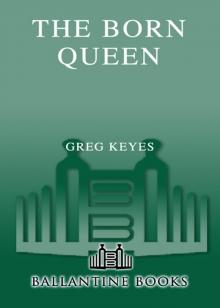 The Born Queen
The Born Queen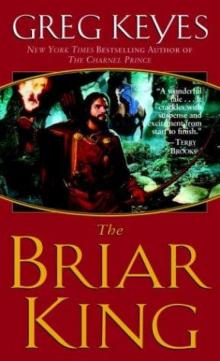 The Briar King
The Briar King Star Wars The New Jedi Order - Dark Journey - Book 10
Star Wars The New Jedi Order - Dark Journey - Book 10 Star Wars: New Jedi Order Book 8b: Emissary of the Void
Star Wars: New Jedi Order Book 8b: Emissary of the Void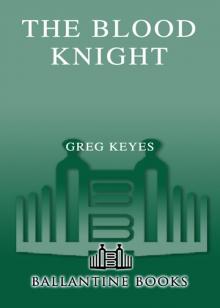 The Blood Knight
The Blood Knight Star Wars - Edge of Victory - Book 1: Conquest
Star Wars - Edge of Victory - Book 1: Conquest Edge of Victory 2 Rebirth
Edge of Victory 2 Rebirth Lord of Souls: An Elder Scrolls Novel
Lord of Souls: An Elder Scrolls Novel The Born Queen tkotab-4
The Born Queen tkotab-4 Rebirth: Edge of Victory II
Rebirth: Edge of Victory II Conquest: Edge of Victory I
Conquest: Edge of Victory I Emissary of the Void
Emissary of the Void The Blackgod
The Blackgod Star Wars The New Jedi Order - The Final Prophecy - Book 19
Star Wars The New Jedi Order - The Final Prophecy - Book 19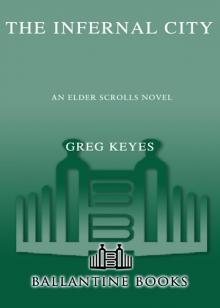 The Infernal City
The Infernal City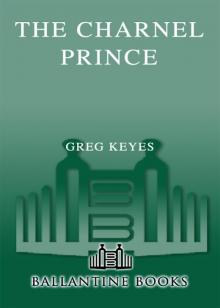 The Charnel Prince
The Charnel Prince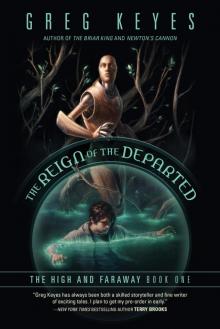 The Reign of the Departed
The Reign of the Departed Lord of Souls es-2
Lord of Souls es-2 Chosen of the Changeling
Chosen of the Changeling Dawn of the Planet of the Apes
Dawn of the Planet of the Apes Footsteps in the Sky
Footsteps in the Sky PACIFIC RIM UPRISING ASCENSION
PACIFIC RIM UPRISING ASCENSION The Final Prophecy: Edge of Victory III
The Final Prophecy: Edge of Victory III